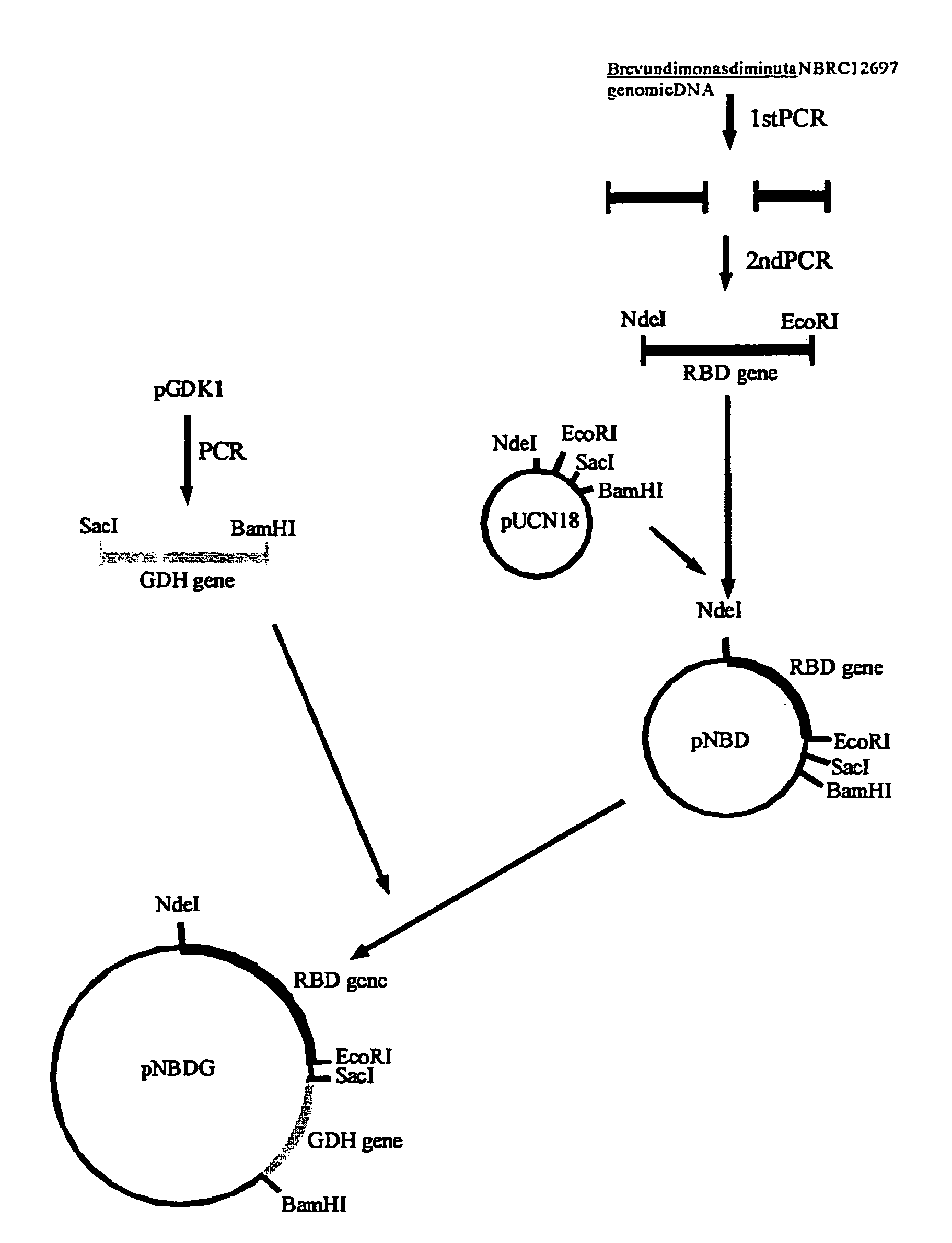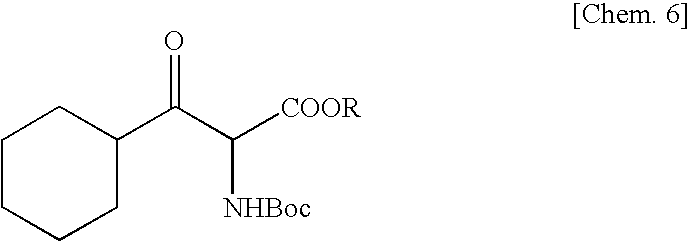Method for production of erythro-or threo-2-amino-3-hydroxypropionic acid ester, novel carbonyl reductase, gene for the reductase, vector, transformant, and method for production of optically active alcohol using those
a technology of erythroorthreo-2amino-3 hydroxypropionic acid and ester, which is applied in the direction of peptides, organic chemistry, microorganisms, etc., can solve the problem that the method has not been found ou
- Summary
- Abstract
- Description
- Claims
- Application Information
AI Technical Summary
Benefits of technology
Problems solved by technology
Method used
Image
Examples
synthesis example 1
[0087]To 18.1 g of benzophenone imine were added 20 g of glycine tert-butyl ester hydrochloride and 100 ml of methylene chloride, and the mixture was stirred at room temperature for 62 hours. Distilled water (100 ml) was added and, after phase separation, the organic layer was concentrated and dried under reduced pressure to give 28.8 g of a glycine derivative. A THF solution (140 ml) of this compound was added dropwise to a THF solution (60 ml) containing 10.9 g of KOtBu at −70° C. Thereafter, this solution was added dropwise to a THF solution (50 ml) containing 14.2 g of cyclohexanecarbonyl chloride at −78° C. and, then, the mixture was stirred for 1 hour. Thereto was added 150 ml of 1 M citric acid, and the mixture was stirred at room temperature for 15 hours. The THF was removed by concentration under reduced pressure, the residue was extracted with ethyl acetate, and 100 ml of ethanol, 61.7 g of Na2CO3 and 23.3 g of Boc2O were added to the aqueous layer obtained and the mixture...
example 1
Production of Tert-butyl Erythro- or Threo-N-Boc-2-amino-3-cyclohexyl-3-hydroxypropionate Using Bacterial Cells
[0088]In each large test tube, there was prepared 5 ml of a liquid medium (pH 7) having the following composition: 10 g of meat extract, 10 g of peptone, 5 g of yeast extract and 3 g of NaCl (per liter). The medium was steam-sterilized at 120° C. for 20 minutes. This medium was inoculated with one loopful of cells, cultured in advance in the same medium on a plate, of one of Arthrobacter paraffineus ATCC 21218, Bacillus licheniformis NBRC 12195, Bacillus subtilis ATCC 14593, Bacillus thuringiensis NBRC 3951, Brevundimonas diminuta NBRC 12697, Corynebacterium ammoniagenes NBRC 12072, Enterobacter aerogenes NBRC 13534, Morganella morganii subsp. morganii NBRC 3168, Oerskovia turbata NBRC 15015, Paenibacillus alvei NBRC 3343, Pectobacterium carotovorum subsp. carotovorum NBRC 3830, Pectobacterium carotovorum subsp. carotovorum NBRC 12380, Pectobacterium carotovorum subsp. caro...
example 2
Production of Tert-butyl erythro-N-Boc-2-amino-3-cyclohexyl-3-hydroxypropionate Using Yeast Cells
[0092]In each large test tube, there was prepared 5 ml of a liquid medium (pH 7) having the following composition: 40 g of glucose, 3 g of yeast extract, 7 g of KH2PO4, 13 g of (NH4)2HPO4, 1 g of NaCl, 0.8 g of MgSO4.7H2O, 60 mg of ZnSO4.7H2O, 90 mg of FeSO4.7H2O, 5 mg of CuSO4.5H2O and 10 mg of MnSO4.4-6H2O (per liter). The medium was steam-sterilized at 120° C. for 20 minutes. This medium was inoculated with one loopful of cells, cultured in advance on an agar medium (pH 7) having the composition comprising 200 g of malt extract and 20 g of agar (per liter), of one of Candida magnoliae NBRC 0705, Debaryomyces polymorphus ATCC 20280, Pichia anomala NBRC 0120, Pichia minuta var. minuta NBRC 0975, Pichia minuta var. nonfermentans NBRC 1473, Pichia xylosa NBRC 0950, Rhodotorula glutinis var. dairenensis NBRC 0415, Saccharomycopsis fibuligera NBRC 0104, Saturnispora saitoi NBRC 1134, Trigon...
PUM
| Property | Measurement | Unit |
|---|---|---|
| temperature | aaaaa | aaaaa |
| pH | aaaaa | aaaaa |
| temperature | aaaaa | aaaaa |
Abstract
Description
Claims
Application Information
 Login to View More
Login to View More - R&D
- Intellectual Property
- Life Sciences
- Materials
- Tech Scout
- Unparalleled Data Quality
- Higher Quality Content
- 60% Fewer Hallucinations
Browse by: Latest US Patents, China's latest patents, Technical Efficacy Thesaurus, Application Domain, Technology Topic, Popular Technical Reports.
© 2025 PatSnap. All rights reserved.Legal|Privacy policy|Modern Slavery Act Transparency Statement|Sitemap|About US| Contact US: help@patsnap.com



